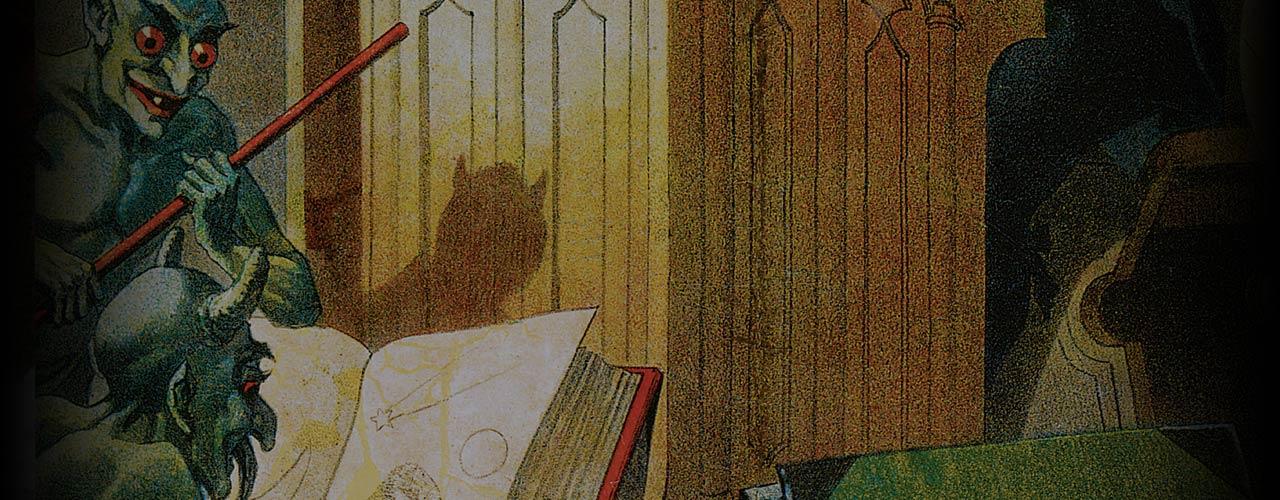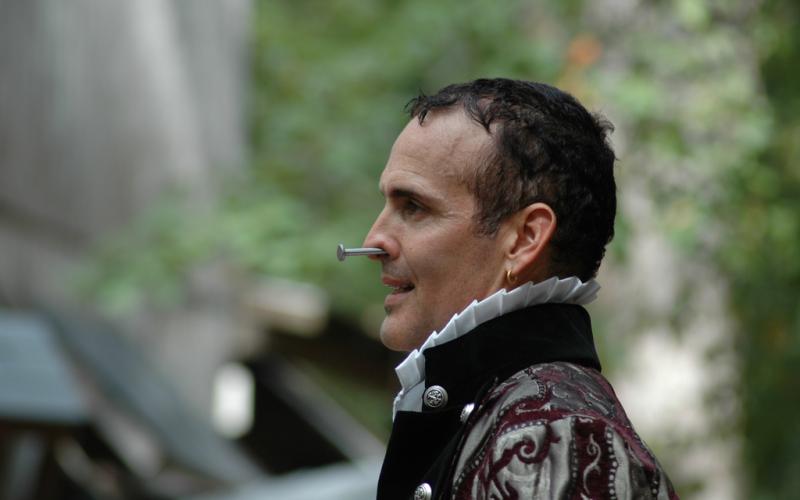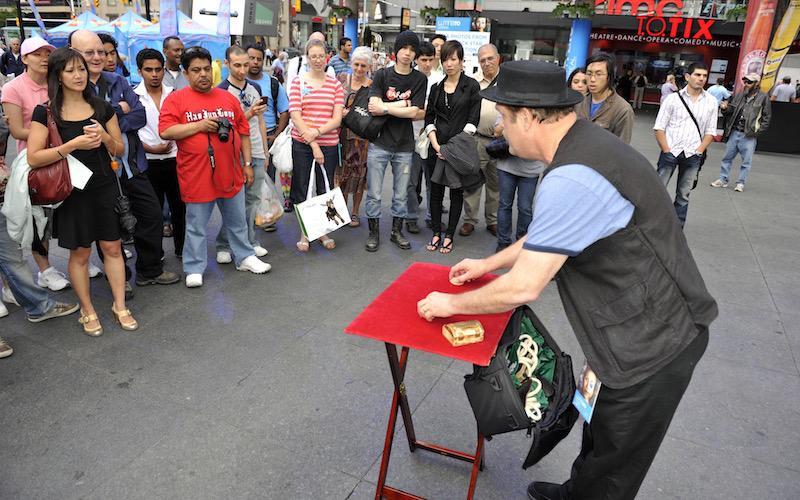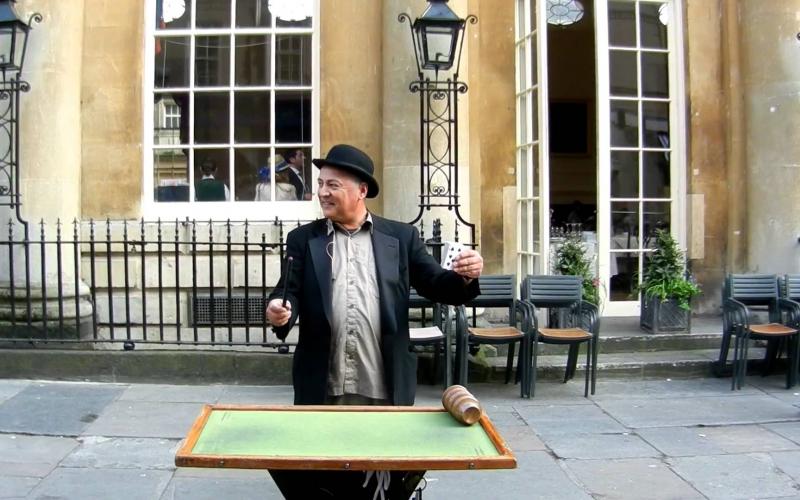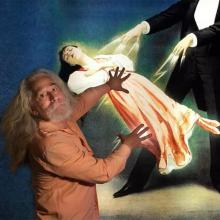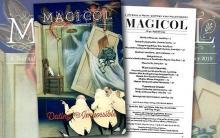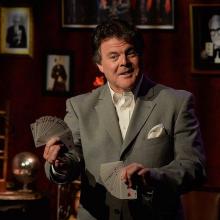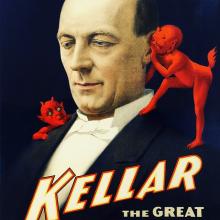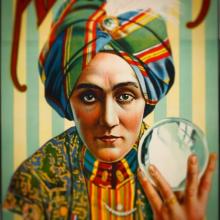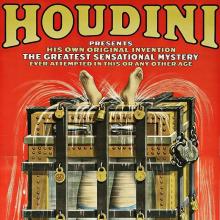Submitted by Jamy Ian Swiss on
STREET MAGIC, PART 2
In last week’s Take Two, we looked at modern magic busking, which used to be known (and frankly still is among those who do it) as street magic, albeit that term has been hijacked by television magic, and also as a marketing ploy for the online magic industry, as I discuss elsewhere in my essay, “In Search of Street Magic.”
We looked at three performances, by Jeff Sheridan, the founder of modern urban street magic—Chris Capehart, a contemporary master and early pioneer—and the late Cellini, an influential and beloved mentor.
Cellini was a student of the legendary magician Slydini, someone I will be writing about in the future. But back when Cellini was first getting into street magic, he was also influenced by a contemporary, Bob Sheets, who was doing street magic in Colorado. Bob’s character was that of the “Jolly Jester,” which he refined through steady work at Renaissance Festivals, a popular source of steady work for buskers. Bob’s jester character included a funny hat, genie shoes, and a revival of the use of the gibecière, a centuries-old design of pouch, worn at the waist that serves as large pockets for props. Although a commonplace among busking magicians today, especially for any who perform the Cups and Balls, Bob Sheets was among the first, or possibly the first, to revive it for modern street performers, and the style spread quickly through the Ren Fest community as it suited the pseudo-historical garb of that subculture.
Bob Sheets is widely recognized as one of the best comic sleight-of-hand magicians of our time. While he influenced street performers early on, he also worked for a time with legendary Chicago Magic Bartender, Al “Heba Haba” Andrucci, and adopted and developed that style of magic and brought it back to Colorado, where he worked as a Magic Bartender at the Jolly Jester, circa 1976 to 1980, and then at the Tower Bar and Restaurant, eventually moving to Maryland to become a partner in the Brook Farm Inn of Magic in Chevy Chase, and subsequently the Inn of Magic in Wheaton.
Sheets was joined at Jolly Jester by Steve Spill, and eventually they created the Bob & Steve Show, which was the sole show at the Brook Farm, as I wrote about in Take Two #8 about Steve. As I mentioned there, Bob not only brought Steve Spill into the Magic Bartender fold, but also went on to train Doc Eason (who in turn brought in Eric Mead, also a Sheets acolyte), J.C. Wagner, Scotty York, and myself.
Bob was a staple of Ren Fairs for many years, along with a long list of accomplished performers, including no less than Penn & Teller. Penn was a veteran street juggler (who revived several old vaudeville bits that became standards yet again, including the ping-pong ball on nose, and the apple eating), working the same streets of Philadelphia that Chris Capehart did (and eventually Teller for a time). In fact, Penn Jillette and Teller were first introduced to one another by the musician Wier Chrisemer, and Penn and Teller first performed together at The Minnesota Renaissance Festival in 1975. The three—juggler, magician, and musician—would form the trio known as the Asparagus Valley Cultural Society, and have great success in San Francisco and Philadelphia, until Chrisemer departed and the remaining duo became Penn & Teller.
Like many street performers and Magic Bartenders, Bob eventually went on to more conventional venues, corporate and private events. Some performers who come from those backgrounds do not adapt well to these kinds of audiences and settings, however, as on the street and behind the bar you have to work very strong, and you need to learn to dial it down a bit if you’re going to make it in more traditional confines. Bob, along with Chris Capehart, adjusted and adapted successfully.
I’m unable to locate online footage of Bob Sheets in his Jolly Jester attire, but here is decent video of him performing out of doors, doing his outstanding version of the ancient Three Shell Game. Now, don’t forget, you need to do your part to make the most of this: Put the smartphone down, expand the browser, and turn up the sound. And remember, as Bob says: Don’t play this for money!
Bob Sheets: The Three Shell Game
When you talk about contemporary magician buskers, it rarely takes long for several names to come up, and one of those is that of Jimmy Talksalot. A New Orleans native, and frequent San Diego visiting performer, Jimmy is an incredibly charming and gentle spirit, adored and appreciated by audiences and fellow performers alike. Here’s a full street set from this modern master of the street. You’ll get so see the whole process, as he begins to gather a crowd, and concludes by making his “pitch” for the hat.
Jimmy Talksalot: Walking & Working in New Orleans
Another contemporary name that quickly arises in any conversation about busking with magic is that of British street magician, Gazzo. A veteran at popular street performance center, Covent Garden, Gazzo has worked across the United States, becoming resident performer in popular street performance centers including Boston’s Faneuil Hall Marketplace (better known as Fanny Hall), and Key West (New York’s Washington Square Park, Baltimore’s Inner Harbor, and San Diego’s Balboa Park are also examples). Gazzo is one of the rare street performers (like Capehart and Sheets, among a few others) to be widely appreciated within the magic world (partly because of a distinctive set of card skills he brought with him when he first came on the American magic scene in the early 1980s), as by and large, street performing is a separate sub-culture that largely keeps to itself.
The Cups and Balls is a staple of street performance today, as it has been for centuries. Last week you saw Cellini perform it; this week I give you Gazzo’s version. Although the Cups and Balls has been performed on the streets of England for centuries, if you look at British street performers on YouTube, you will see that most are imitating Gazzo’s routine.
Gazzo: Street Theatre
Of course, magicians are far from the only variety performers who busk on the streets, and typically where there’s magic, there is also juggling. In New York City, one of my favorites has long been Master Lee, who I don’t believe still works the streets, but whom I first saw decades ago in Greenwich Village’s Washington Square Park, doing hour-long shows for huge crowds in the large dry circular fountain. Here in San Diego’s popular Balboa Park, you can sometimes catch David Kamatoy, a superb street juggler. (Magicians who have been staples at Balboa Park include Steven “Sleeveless” Sloan, Jimmy Talksalot, and among the younger generation, Kris Bentz.)
Keep in mind that the names I mention in these two pieces represent a fraction of the population of professional buskers. While some do travel across the country and the world, many remain local through most of their careers. And many more perform on the street for a brief period, and then move on to other venues, or oftentimes, to other more stable careers and lifestyles.
That said, if I’m going to feature one busker performing something other than magic, the choice is a no-brainer: that would have to be Johnny Fox. A Cellini acolyte going back to the days of Colorado streets and cross-country Ren Fairs, Fox is a master of a rare specialty, the sideshow skill of sword swallowing. Like sideshow maestro Todd Robbins, Fox was also a protégé of Melvin Burkhart, the originator of the famed sideshow staple, the Blockhead act. Fox is also a longtime collector of sideshow memorabilia, at one time managing his own storefront “Freakatorium” in New York City. He has also, in the Cellini tradition, paid it forward, influencing countless other performers who followed in his path—from Colorado magician Eric Mead to the current young sword swallowing phenomenon, Los Angeles-based Brett Loudermilk—and during a recent health crisis, many came out in force on social media to declare their appreciation and debt to this contemporary master. Expand the browser, turn up the sound, and enjoy the smooth-as-silk polish of this vintage performance from the one and only Johnny Fox.
Johnny Fox: Keep on Crusin Show 14
This survey of magician buskers is a mere introduction to the subject, without exploring the details of their specific craft—how they grab and hold audiences, and get them to pay for the privilege of an unexpected performance—and presenting a tiny handful of names and performances. But it’s appropriate to conclude with another performance by Johnny Fox, because in fact, Fox is also an accomplished magician, and he always began his shows with the Cups and Balls, and closed with the swords. Here is the inimitable Johnny Fox, performing the Cups and Balls on the street, as we have been watching and enjoying for centuries, and will no doubt continue till the end of civilization.
Johnny Fox's Magic Balls
Johnny Fox has brought smiles to thousands over the years, but unfortunately, those joyous moments may soon become only memories, as Johnny's health has taken a sharp turn for the worse in recent months. If you are interested, there is a now GoFundMe page to support Johnny. Visit this link for more information.
SEE TAKE TWO INDEX

